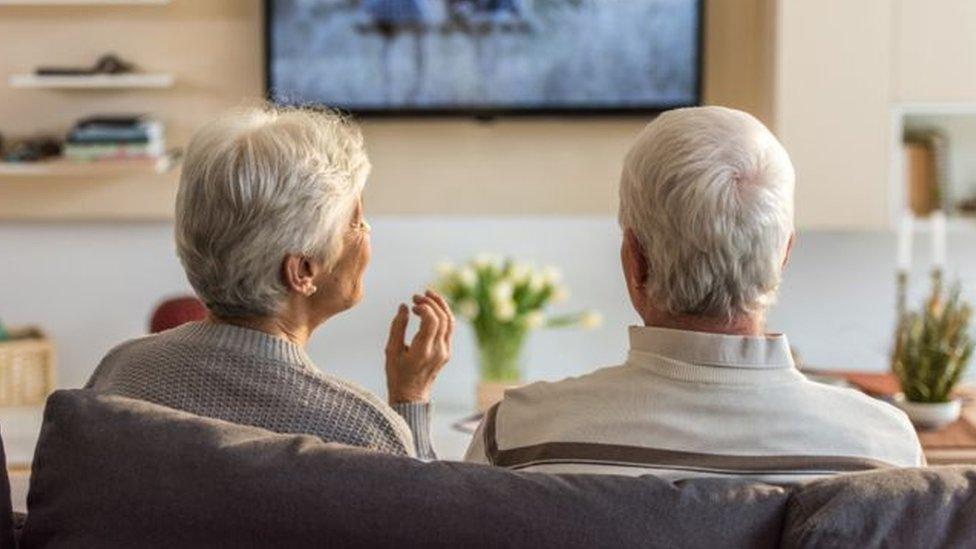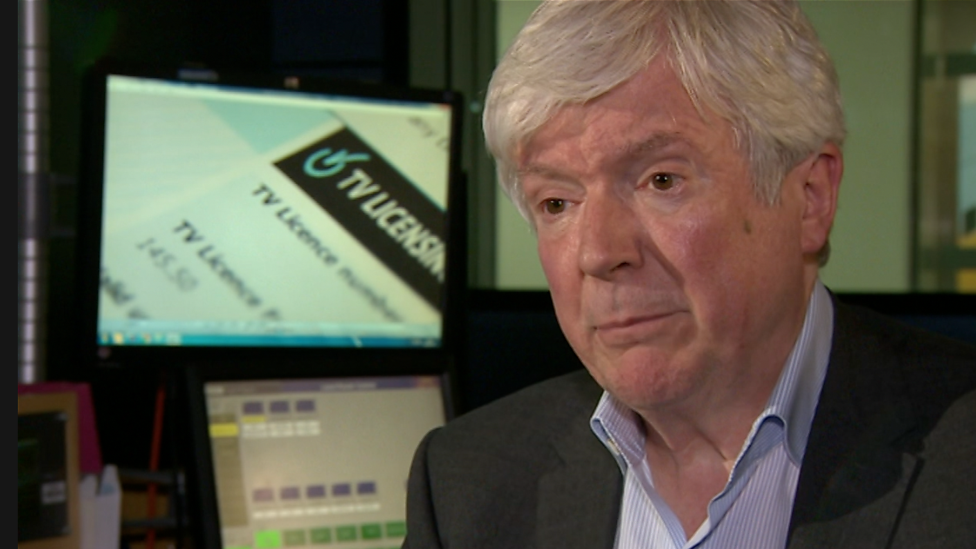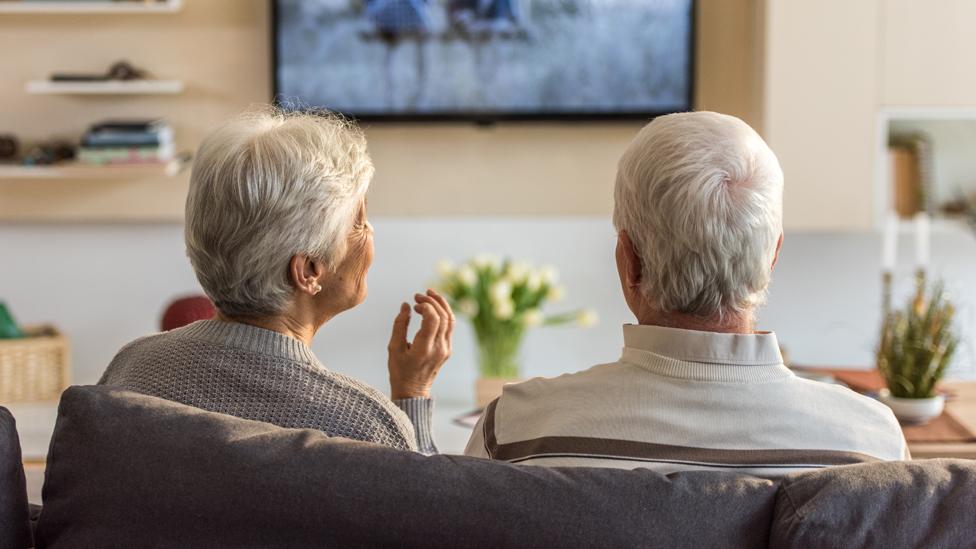TV licences: Call for government and BBC to save free over-75s licences
- Published
- comments

The BBC and the government should find a way to save free TV licences for all over-75s, a committee of MPs has said.
The House of Commons media select committee said the new position, where only those claiming pension credit will be eligible, was an "absurd situation".
The BBC said it will continue to scrap free TV licences for up to 3.7m people.
A government spokesman said: "We're disappointed with the BBC's decision not to continue free licences for the over-75s."
He added: "We've been clear that we want and expect it to continue this concession. Taxpayers want to see the BBC using its substantial licence fee income in an appropriate way to ensure it delivers for UK audiences. We will respond to the select committee report in due course."
'Flawed' on both sides
However Sir David Clementi, chairman of the BBC, said the committee recognised there was no "automatic assumption" that the BBC would continue to bear the cost of the free TV licences.
MPs also said there was "clear evidence" the BBC's funding model was at risk as young people switch to online services.
"Behind closed doors" negotiations over licence fee funding - which led to the June 2019 decision to end free licences for many over-75s from next year - were "flawed" on both sides, the Digital, Culture, Media and Sport Committee said.
BBC director general Tony Hall was criticised in the committee's report, external for his handling of the 2015 negotiations.
The MPs said he failed to seek the formal agreement of the BBC Executive Board before recommending to the BBC Trust the deal struck with the government. They added the BBC should have communicated earlier that it would not be able to fund all the free licences from 2020.
The committee also said the government was wrong to "bounce" the BBC into accepting a deal, adding the corporation put itself in an "invidious position" as an administrator of welfare benefits.
£154.50Annual cost for colour TV
£745mEstimated cost to the BBC of current scheme by 2021/22
£250mEstimated cost of new scheme depending on take-up
190,000people consulted on the change
52%in favour of reforming or abolishing free licence scheme
The BBC had initially agreed in 2015 to take on responsibility for funding the scheme by 2020, as part of the charter agreement, which sets out the arrangements for the governance of the BBC.
However, under the new rules announced by the BBC in June, only low-income households where one person receives the pension credit benefit will still be eligible for a free licence.
Funding free TV licences for all over-75s would have resulted in "unprecedented closures", the BBC said in June.
The MPs' report said: "It is clear from the correspondence between the government and the BBC in 2015 that there was no automatic assumption that the BBC would continue to bear the costs of a blanket licence fee exemption for over-75s."
'Not a fair way' to treat people
Damian Collins, chairman of the committee, said the BBC and the government must "come up with a long-term plan" to continue the funding.
Older viewers were "made a promise by the government and the BBC that free licence fees for everyone over 75 would continue", he told BBC News.
"And they end up in a position now where they're being told it's no longer going to happen. It's happened as a result of a deal done behind closed doors between the government and the BBC that was badly carried out, badly thought through.
"Clearly the BBC's sums don't add up now and they can't afford to take on that responsibility. Therefore, for there to be a sleight of hand to say, 'Oh no, now we're not going to do it, and we never promised that we would', is not acceptable and is not a fair way to treat often very old and vulnerable people in our society."
Free TV licences 'wrong policy'
Ed Vaizey MP, who was culture minister at the time of the deal, admitted the corporation had been "bounced" into the policy.
"There was a negotiation, there was a bit of give and take, but I do think looking back that it was wrong to impose on the BBC what was effectively a welfare policy and then to ask them to take responsibility for it going forward," he told BBC Radio 4's Today programme.
The BBC has come up with the correct solution, though, he added. "I think a free TV licence for everyone over 75 is probably the wrong policy," he said.
"But I do agree with the select committee that if it is the government's view that there should be a free TV licence for everyone over 75, the government should partner with the BBC and help to fund that cost."
'Don't victimise older people'
Broadcaster Dame Esther Rantzen, founder of the Silver Line helpline, said many isolated older people relied on BBC TV, and urged the government and the corporation to get together to find a solution.
"Please don't victimise people who depend upon BBC television for the only company in their lives," she told BBC Breakfast.
Former BBC chairman Lord Grade said free TV licences should be saved for all over-75s, but that the corporation was "blameless". He told Breakfast: "The BBC cannot afford to pay for it," adding that it had already done "sterling work" in finding the £250m required to cover free licences for those on pension credit.

Viewing habits are evolving and changing
The report also said it uncovered a "disturbing picture" of the overall finances of the BBC, as the income from the licence fee fails to keep pace with the cost of production.
As the report was published, Mr Collins added the "rapidly changing viewing habits of younger audiences" moving away from broadcast TV to online and on demand channels "poses a further threat to BBC licence fee revenue in the future".
He said: "We are seeing clear evidence that the funding model of the BBC will become unsustainable without substantial increases in commercial revenue from BBC Studios and new subscription on demand viewing services like Britbox."
The report criticised "poor management, leadership and governance at the BBC", which it blames for issues such as the tax dispute that affected some presenters.
And it said there was "still a long way to go" in resolving the gender pay gap, although there was some evidence the BBC is continuing to work to resolve it.
'Different way of doing things'
Sir David Clementi added: "There is also clear recognition from the committee that it would be unsustainable for the BBC to take on the full cost of all these free licences alone.
"That's why there must be a different way of doing things in the future."

Follow us on Facebook, external, on Twitter @BBCNewsEnts, external, or on Instagram at bbcnewsents, external. If you have a story suggestion email entertainment.news@bbc.co.uk, external.
- Published11 June 2019

- Published10 June 2019
